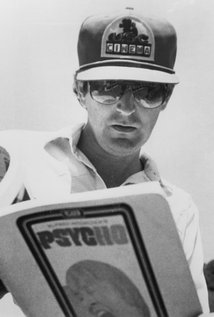
Richard Franklin
Birthday:
15 July 1948, Melbourne, Victoria, Australia
Writer, director and producer Richard Franklin was born on July 15, 1948 in Melbourne, Australia. Infatuated with cinema at an early age, Franklin first began making 8mm films at age 10. Franklin saw Alfred Hitchcock's "Psycho" two years later and was hooked on movies for life. Richard enrolled at Monash University in Melbourne and w...
Show more »
Writer, director and producer Richard Franklin was born on July 15, 1948 in Melbourne, Australia. Infatuated with cinema at an early age, Franklin first began making 8mm films at age 10. Franklin saw Alfred Hitchcock's "Psycho" two years later and was hooked on movies for life. Richard enrolled at Monash University in Melbourne and worked as an assistant cameraman at a television advertising company. Franklin eventually went to America and attended the University of Southern California in 1967. While studying at USC Franklin got Hitchcock to do a Q&A session for a screening of "Rope." Hitchcock in turn invited Franklin to watch him work on the set of "Topaz." Franklin returned to Australia following graduation in 1969 and got a job as an assistant director for the popular TV series "Homicide." Franklin went on to direct several episodes. He also made several short movies and documentaries around this time. Franklin made his feature film debut with the raunchy sex comedy "The True Story of Eskimo Nell." He followed this picture with the equally bawdy "Fantasm." His third movie "Patrick" was a nifty horror feature that proved to be a big international success; it won the Grand Prize at the Avoriaz Fantastic Film Festival, was nominated for an AFI Award for Best Film, and won the Best Director Award at the Sitges-Catalonian International Film Festival. "Roadgames" was a tense and witty "danger on the road" thriller knockout which was the most expensive Australian film made in the early 80s. Franklin then did the surprisingly solid and satisfying belated sequel "Psycho II." His other movies include the delightful "Cloak and Dagger," the silly "Link," and the hugely enjoyable "F/X 2." However, Franklin became weary of Hollywood studio politics and returned to his native Australia. He made the acclaimed play adaptations "Hotel Sorrento" and "Brilliant Lies." "Hotel Sorrento" won an AFI Award for Best Adapted Screenplay and was nominated for both Best Film and Best Director. Franklin also did a made-for-TV adaptation of Arthur Conan Doyle's classic fantasy adventure novel "The Lost World." His final feature was the horror thriller "Visitors." In addition to his film work, Franklin also directed episodes of the TV shows "Flatland," "A Fine Romance," and "Beauty and the Beast." He was a drummer in the Melbourne band The Pink Finks and was a lecturer at the Swinburne School of Film and Television in Australia. Richard Franklin died from prostate cancer at age 58 on July 11, 2007. Show less «
We're already a cross-culturalized society. I'm always concerned whether my friends in America will be able to understand what we're saying ...Show more »
We're already a cross-culturalized society. I'm always concerned whether my friends in America will be able to understand what we're saying on screen. I'm trying to be true for Australians and true to the international audience. I'm all for personal film, but if I can make a statement that's universal, is it any less personal? Show less «
I like to work fast. I think if you're adequately prepared, there's no reason to stand around waiting for the muse to strike. It's much bett...Show more »
I like to work fast. I think if you're adequately prepared, there's no reason to stand around waiting for the muse to strike. It's much better to have all the plans in place. I see no advantage on trying something twenty different ways to come back to the way you should have done it in the first place. Show less «


